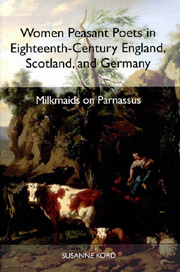Book contents
- Frontmatter
- Contents
- List of Illustrations
- Acknowledgments
- Introduction: Aesthetic Evasions and Social Consequences
- 1 Back to Nature: Bourgeois Aesthetic Theory and Lower-Class Poetic Practice
- 2 The Wild and the Civilized: Poet Making
- 3 The Life As the Work: Counterfeit Confessions, Bogus Biographies, Literary Lives
- 4 A Literature of Labor: Poetic Images of Country Life
- 5 Inspired by Nature, Inspired by Love: Two Poets on Poetic Inspiration
- 6 Of Patrons and Critics: Reading the Bourgeois Reader
- Conclusion: On the Gender and Class of Art
- Appendix: Short Biographies of Women Peasant Poets
- Works Cited
- Index
4 - A Literature of Labor: Poetic Images of Country Life
Published online by Cambridge University Press: 05 February 2013
- Frontmatter
- Contents
- List of Illustrations
- Acknowledgments
- Introduction: Aesthetic Evasions and Social Consequences
- 1 Back to Nature: Bourgeois Aesthetic Theory and Lower-Class Poetic Practice
- 2 The Wild and the Civilized: Poet Making
- 3 The Life As the Work: Counterfeit Confessions, Bogus Biographies, Literary Lives
- 4 A Literature of Labor: Poetic Images of Country Life
- 5 Inspired by Nature, Inspired by Love: Two Poets on Poetic Inspiration
- 6 Of Patrons and Critics: Reading the Bourgeois Reader
- Conclusion: On the Gender and Class of Art
- Appendix: Short Biographies of Women Peasant Poets
- Works Cited
- Index
Summary
Physical Labor and Poetic “Idleness”
And few amid the rural tribe have time
To number syllables and play with rhyme.
— George Crabbe, “The Village”Labor is A significant aspect in considering the poetic work of peasant women, and in more ways than merely the thematic or biographical. Labor as a feature in the poets' lives and a theme in their works is of obvious importance, given that this is literature produced by laborers, that many of them viewed their poetic endeavors as antithetical to or a potential escape from (physical) labor, and that either the description or avoidance of labor constitutes a defining characteristic of some of their literature. Although I consider these contexts in this chapter, the chapter's focus is, as with previous chapters, on the social and the aesthetic. It is the representation or absence of labor as a theme in their poetry that best indicates the degree to which laboring poets either tried to write social history from below or, alternately, adapted aristocratic genres, such as pastoral poetry, simultaneously conforming to the bourgeois injunction to write pastorals because the genre was seen as expressive of the rural poets' background. And finally, labor as a concept figures significantly in analyses of the process of writing. What Weinstein has stated for nineteenth-century American literature can equally be applied to this context: “Writing was supposed to appear effortless, natural, and easy. … Simply put, writing was not supposed to look like work.…”
- Type
- Chapter
- Information
- Women Peasant Poets in Eighteenth-Century England, Scotland, and GermanyMilkmaids on Parnassus, pp. 160 - 193Publisher: Boydell & BrewerPrint publication year: 2003



